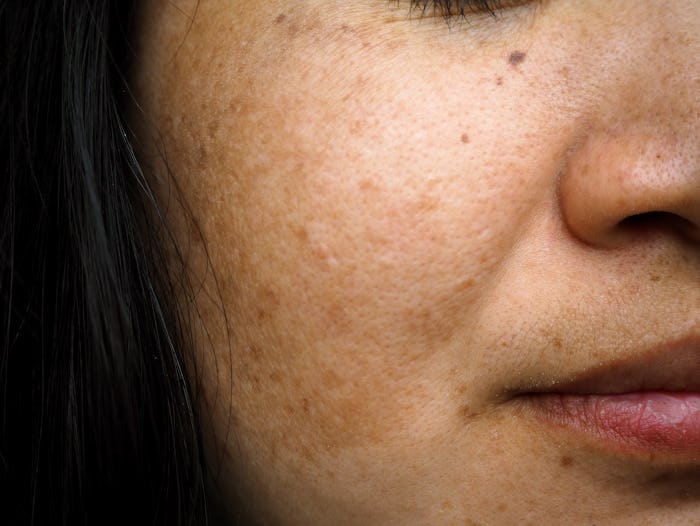Life

If Your Melasma Won't Go Away After Pregnancy, Here's What You Should Know
For plenty of people, a smiling baby isn't the only lasting reminder of pregnancy. Your skin can also look a bit different post-baby. So if you're dealing with melasma that just won't go away after pregnancy, know that these darkened patches of skin likely won't last forever. But if you're concerned, there are a few things you can do to treat it.
Also known as the "mask of pregnancy," melasma is a common skin condition encountered during gestation. For most people, melasma causes the appearance of darker patches of skin on the cheeks, nose, forehead, and chin, as well as the area just above the upper lip, according to the American Academy of Dermatology. These patches may be brown or gray-brown in color. "Most of the time, melasma fades post pregnancy, but for others it doesn’t for an unknown reason," Kecia Gaither, MD, MPH, FACOG, double board-certified in OB/GYN and Maternal Fetal Medicine, and Director of Perinatal Services at NYC Health + Hospitals Lincoln, tells Romper via email. "For those individuals where it doesn’t, seek consultation with a dermatologist, as there are certain dermatological options to address it."
Once in the office, your derm will probably have several recommendations on hand. A hydroquinone-topical solution, which causes skin whitening, is the most commonly used treatment, as Dr. Gaither explains. In general, hydroquinone helps decrease the formation of melanin in the skin, which is what creates the brown pigmentation. It's used to lighten the appearance of melasma, as well as other spots of darkened skin such as freckles.
However, hydroquinone isn't the only option for treating melasma. There are some acid treatments that are available, including retinoic acid, glycolic acid (or peels), lactic acid lotions, and kojic acid, says Dr. Gaither. To put it simply, the acid treatments also help slow the production of melanin, generally causing the appearance of melasma to decrease over time.
Although these treatments can be effective, they do have potential side effects. For the most part, skin irritation is a common concern, as Dr. Gaither explains. But there can be one rather serious drawback to using the most common treatment for melasma. As it turns out, people who have "long term use of hydroquinone (in a high concentration, generally above 4 percent) are at risk of developing a condition known as exogenous ochronosis. With this condition, the skin actually darkens — permanently," says Dr. Gaither. In other words, it can have exactly the opposite effect.
Lastly, don't feel pressured in any way to change the appearance of your melasma if it doesn't bother you. It's a normal and common side effect of pregnancy. Also, remember that melasma does not cause any health risks, so it's simply a harmless change in your complexion, according to Harvard Health Publishing. And for the majority of people, patience is the best medicine anyway, because melasma brought about by pregnancy will usually go away on its own after a few months or so. But if you aren't a fan of this change to your skin (and that's OK, too), just know that there are plenty of options to treat melasma available.